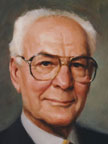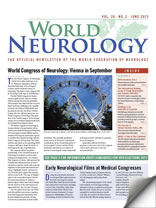 Eli S. Goldensohn, a pioneer in the development of video-EEG monitoring, passed away March 22, 2013, at the age of 97. During his long career, he was on the faculties of the University of Colorado, University of Pennsylvania School of Medicine, the College of Physicians & Surgeons at Columbia University, and after retiring from Columbia, he spent more than a decade at the Albert Einstein College of Medicine.
Eli S. Goldensohn, a pioneer in the development of video-EEG monitoring, passed away March 22, 2013, at the age of 97. During his long career, he was on the faculties of the University of Colorado, University of Pennsylvania School of Medicine, the College of Physicians & Surgeons at Columbia University, and after retiring from Columbia, he spent more than a decade at the Albert Einstein College of Medicine.
Trained as a neurophysiologist, he was recruited into neurology by G. Milton Shy during their Colorado days. Shy later brought him to the University of Pennsylvania. During his years in Philadelphia (1962-1967), I greatly valued Goldensohn’s friendship and his gentle but expert guidance for a newly minted member of the Penn faculty. His understanding of clinical epilepsy was amazingly complete, ranging from concepts of causation to the best possible treatments for individuals with epilepsy.
It was during those years that he pioneered the development of video-EEG monitoring at a time when the available equipment was rudimentary. Goldensohn carried out key laboratory studies to understand the pathophysiology of the epileptic focus in animals, and from that the possible substrates of an epileptic discharge in patients. He was doing “translational research” before the term was invented. His warmth and modesty were inspiring. He never lost those qualities.
As he supervised many residents and epilepsy fellows, he consistently emphasized the importance of interpreting EEGs based on underlying physiological mechanisms rather than relying on pattern recognition alone, which was the general approach at the time. During his career, Goldensohn had a major impact on many clinicians and scientists, transmitting both his enthusiasm and knowledge.
His efforts were invaluable for people with epilepsy in every country. He was delighted to accept invitations to visit former trainees in many countries, including Belgium, Peru and Taiwan. Goldensohn served as president of the American Clinical Neurophysiology Society, American EEG Society, the Eastern EEG Society and of the American Epilepsy Society and chair of the Professional Advisory Board of the Epilepsy Foundation of America. The AES William G. Lennox Award was among his many honors.
Goldensohn was particularly proud of having assembled and published his late brother Leon Goldensohn’s interviews of Nazi defendants and witnesses at the Nuremberg Trials (“The Nuremberg Interviews,” 2004, Knopf).
Goldensohn will be sorely missed by his many friends and colleagues, and most of all by his loving family, Betty, his wife of 75 years, his children Ellen and Marty, his grandchildren, Ben, Sasha, Rosie and Emma, and two great-grandchildren, Sophie and Theo. Eli and Betty’s son Richard died in 1985.
